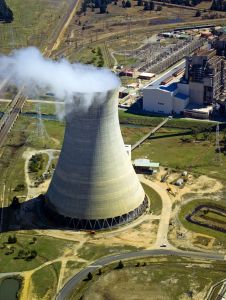Clean coal has been getting a lot of attention lately. Both Mr. McCain and Mr. Obama consider it to be an important piece in their energy plans. Even the recent $900 billion bailout package included $1.5 billion for clean coal. Because coal is so plentiful and relatively cheap in the US, the notion of clean coal is particularly appealing. Unfortunately, clean coal is a myth. Here’s why clean coal is so dirty:
1. Clean Coal Requires More Coal
30% more energy is required to pump carbon underground for carbon capture and sequestration (CCS). The captured carbon dioxide has to be compressed to 100 times the atmospheric pressure, transferred to an underground storage reservoir and then pumped in the ground. All of this requires large amounts of energy, thus the coal plant must burn an additional 30% more coal to generate the same amount of usable electricity.
2. High Expenses Make It Unfeasible
$5.2 billion in taxpayer money has been spent to foster this technology in the US, yet the results are dismal. A recent government report found that of the 13 projects examined, eight had extended delays or financial problems, six were years behind schedule, and two had gone bankrupt.
3. Commercial Carbon Capture Unlikely by 2020
A study from Australian energy consultancy ACIL Talisman states that CCS will not be available in the short-term to generate electricity with low carbon emissions and that technology breakthroughs are still needed to make this technology feasible. The study does however find that concentrated solar, geothermal, and wind energy already are or will be in commercial use by 2020.
4. Unproven Technology
No commercial scale examples exist. The FutureGen plant in Illinois was to be the showcase for clean coal technology. A total of $50 million was spent, $40 million of which was federal funded. The price tag for the $1.8 billion plant had nearly doubled. The government pulled support for the project due to concern that costs would continue to climb.
5. Coal Mining is Very Harmful
The US averages 30 coal mining deaths annually, while China averages a staggering 8,000. Mountaintop removal mining, a method that is common in Appalachia, destroys ecosystems and has permanently buried over 1,200 miles of streams. Coal mining causes water pollution and lowers the quality of drinking water in neighboring communities. Unfortunately, clean coal technology does not address the many negative impacts of coal mining and could even require large amounts of coal to be mined because of the additional energy needed to sequester carbon emissions.